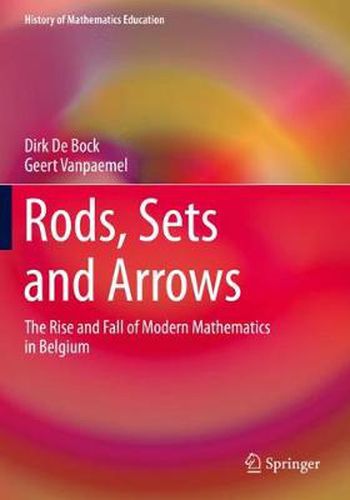Readings Newsletter
Become a Readings Member to make your shopping experience even easier.
Sign in or sign up for free!
You’re not far away from qualifying for FREE standard shipping within Australia
You’ve qualified for FREE standard shipping within Australia
The cart is loading…






This title is printed to order. This book may have been self-published. If so, we cannot guarantee the quality of the content. In the main most books will have gone through the editing process however some may not. We therefore suggest that you be aware of this before ordering this book. If in doubt check either the author or publisher’s details as we are unable to accept any returns unless they are faulty. Please contact us if you have any questions.
For anyone interested in the history and effects of the introduction of so-called Modern Mathematics (or Mathematique Moderne, or New Mathematics, etc.) this book, by Dirk De Bock and Geert Vanpaemel, is essential reading. The two authors are experienced and highly qualified Belgian scholars and the book looks carefully at events relating to school mathematics for the period from the end of World War II to 2010. Initially the book focuses on events which helped to define the modern mathematics revolution in Belgium before and during the 1960s. The book does much more than that, however, for it traces the influence of these events on national and international debates during the early phases of the reform.
By providing readers with translations into English of relevant sections of key Continental documents outlining the major ideas of leading Continental scholars who contributed to the Mathematique Moderne movement, this book makes available to a wide readership, the theoretical, social, and political backdrops of Continental new mathematics reforms. In particular, the book focuses on the contributions made by Belgians such as Paul Libois, Willy Servais, Frederique Lenger, and Georges Papy.
The influence of modern mathematics fell away rapidly in the 1970s, however, and the authors trace the rise and fall, from that time into the 21st century, of a number of other approaches to school mathematics-in Belgium, in other Western European nations, and in North America.
In summary, this is an outstanding, landmark publication displaying the fruits of deep scholarship and careful research based on extensive analyses of primary sources.
$9.00 standard shipping within Australia
FREE standard shipping within Australia for orders over $100.00
Express & International shipping calculated at checkout
This title is printed to order. This book may have been self-published. If so, we cannot guarantee the quality of the content. In the main most books will have gone through the editing process however some may not. We therefore suggest that you be aware of this before ordering this book. If in doubt check either the author or publisher’s details as we are unable to accept any returns unless they are faulty. Please contact us if you have any questions.
For anyone interested in the history and effects of the introduction of so-called Modern Mathematics (or Mathematique Moderne, or New Mathematics, etc.) this book, by Dirk De Bock and Geert Vanpaemel, is essential reading. The two authors are experienced and highly qualified Belgian scholars and the book looks carefully at events relating to school mathematics for the period from the end of World War II to 2010. Initially the book focuses on events which helped to define the modern mathematics revolution in Belgium before and during the 1960s. The book does much more than that, however, for it traces the influence of these events on national and international debates during the early phases of the reform.
By providing readers with translations into English of relevant sections of key Continental documents outlining the major ideas of leading Continental scholars who contributed to the Mathematique Moderne movement, this book makes available to a wide readership, the theoretical, social, and political backdrops of Continental new mathematics reforms. In particular, the book focuses on the contributions made by Belgians such as Paul Libois, Willy Servais, Frederique Lenger, and Georges Papy.
The influence of modern mathematics fell away rapidly in the 1970s, however, and the authors trace the rise and fall, from that time into the 21st century, of a number of other approaches to school mathematics-in Belgium, in other Western European nations, and in North America.
In summary, this is an outstanding, landmark publication displaying the fruits of deep scholarship and careful research based on extensive analyses of primary sources.